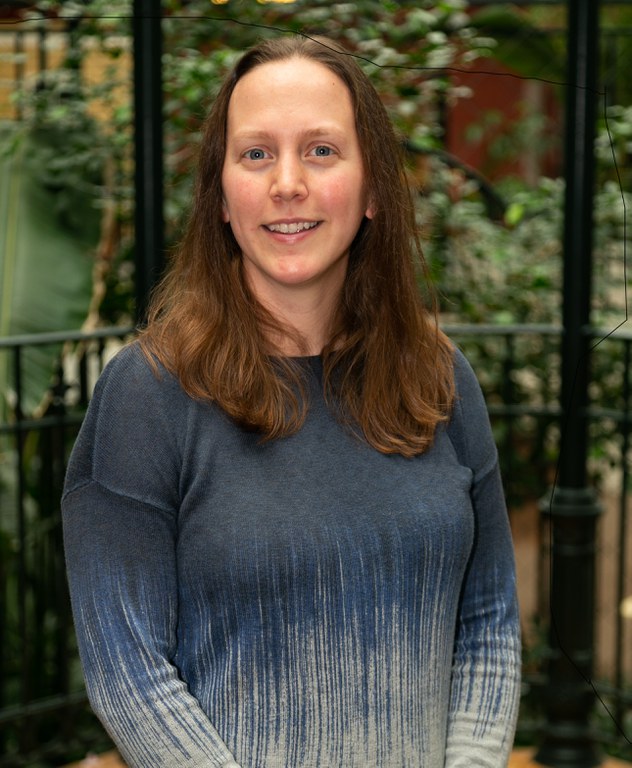A.S. Wildlife Technology 2007; B.S. Wildlife and Fisheries Science, 2009; M.S. Wildlife and Fisheries Science 2011
Emily H. Thomas earned an A.S. in Wildlife Technology in 2007, a B.S. in Wildlife and Fisheries Science, Wildlife option, in 2009, and an M.S. in Wildlife and Fisheries Science in 2011 - all at Penn State.
As an undergraduate, Emily received the Orpha Kelly Rapp and Jesse Rossiter Rapp '15 Prize for Academic Excellence. This award is made each spring to the senior in the School of Forest Resources (now the Dept. of ESM) with the highest grade-point average. Additional recognition of her academic excellence included Senior and Junior Evan Pugh Scholar Awards, the President Sparks Award, and the President's Freshmen Award.
Emily's master's thesis, under the direction of Dr. Margaret Brittingham, professor of wildlife resources, focused on the effects of conventional oil and gas development on forest birds. The research was initiated because it was a significant management issue and challenge for foresters and wildlife managers on the Allegheny National Forest. Although the study had local origins, it gained national interest, and Emily published her work in the Journal of Wildlife Management, one of the primary journals for wildlife-related research. This work also set the stage for later research examining the effects of shale gas development on birds by Emily and others. In recognition of her efforts in this area, Emily was an invited speaker at a symposium on shale gas at the 2018 national conference of The Wildlife Society.
In 2012, Emily was hired as an Instructor in the Wildlife Technology program at Penn State DuBois. Her success in attaining the position reflected her unique combination of intellect, field skills, teaching experience, knowledge of the area, and infectious enthusiasm. Emily now annually teaches six courses, advises approximately 30 students, leads the student chapter of The Wildlife Society, and actively mentors students by getting them involved in research and the profession. The students who arrive at the University Park campus from the Wildlife Technology program tend to have excellent field skills, and they all have the highest respect for Emily as a teacher and leader.
In 2011, Emily received the Best Student Presentation Award from the PA Chapter of The Wildlife Society for a paper on her graduate research. In 2014, she was named the DuBois Educational Foundation Educator of the Year for the 2013-2014 academic year. Nominations for this DuBois award come from the students themselves, and the award goes to a Penn State DuBois faculty member in recognition of excellence in teaching and advising. In addition, Emily was invited to present the commencement address at Penn State DuBois in 2014. In 2015, Emily was one of 10 individuals from the United States and Canada selected to participate in The Wildlife Society's Leadership Institute. This is a year-long program designed to develop leadership skills. Participants are selected based on strong evidence of their leadership potential.
Emily has been heavily involved in service throughout her career. Highlights include her service as the President of the Pennsylvania Chapter of The Wildlife Society, and as a board member of the Pennsylvania Society for Ornithology and the Western Pennsylvania Conservancy. Emily initiated a popular Fall Field Days program for the PA Chapter of The Wildlife Society and hosted the first meeting in 2016. She participates in Christmas Bird Counts and manages bird banding demonstrations for the public at Jamestown Audubon Sanctuary every spring and summer.
While Emily was a student at University Park, she initiated a bird banding program at the Penn State Arboretum. She recruited a handful of students to help. Over time, the program grew, and the students began conducting demonstrations for other Penn Staters, Scout groups, etc. Recognizing how much the wildlife students benefited from the experience, the faculty continued the program after Emily left University Park. Once at Penn State DuBois, Emily started and continues to run a student-led bird banding station where she does research, trains many Wildlife Technology students, and supervises undergraduate research projects.
Emily currently lives in DuBois, PA with her husband, Eric, who is a forester and a 2010 ESM graduate, their children Zoey and Wyatt, and their German shorthair pointers Maggie and Falcon. In her spare time, she enjoys upland bird hunting with her dogs, many outdoor recreation activities, traveling, and spending time with family and friends.
Department of Ecosystem Science and Management
- Office 814-865-7541
- Fax 814-865-3725
Department of Ecosystem Science and Management
- Office 814-865-7541
- Fax 814-865-3725


